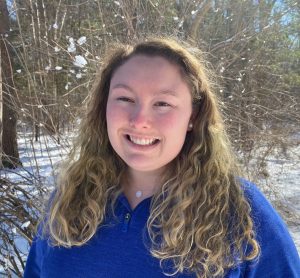Talking to others provides valuable perspective
Brooke Musial ’21
Anthropology major
Marshall Center intergroup dialogue facilitator
Why did you want to be a facilitator?

What led you to choose your major?
“I’m majoring in anthropology and minoring in peace and social justice. I chose to major in anthropology because I appreciate the different perspectives it offers on society and culture. I love learning about how diverse the human experience is and being challenged to see the world from other points of view.”
Have you had any difficult conversations that didn’t go well but were good learning experiences?
“Twice. Reflecting on these conversations has helped me grow as a facilitator. I believe it is important to ‘think before you speak,’ and I make sure I practice this, but these conversations helped me realize that I’m going to make mistakes. I try my hardest not to say anything that is offensive or hurtful to others, but I’m not perfect. Both conversations gave me the opportunity to think about what the best way for me to respond is when I do make a mistake. I hold myself accountable by acknowledging it, apologizing to the person I hurt, and learning how to do better. Sometimes, though, I don’t realize I have made a mistake, which is why I think it is important to invite the other people in the conversation to hold me accountable by letting me know.”
What advice do you have regarding successfully navigating tough talks?
“There are so many helpful strategies, but I think the most important one is listening. In conversations, especially ‘difficult’ or contentious ones, we often do not truly hear what the other person is saying because we are so focused on making our own point. I think people will be able to engage in conversations more effectively and civilly if they make a conscious effort to listen to what others are saying, without judgment and defensiveness, in order to understand rather than to respond. Also, I think it is important to know when to end a conversation. I have never had this happen in dialogue because everybody participating is committed to following the community guidelines we create together. However, in the ‘real world,’ it is sometimes necessary. I also believe that people should not subject themselves to conversations in which they are being disrespected or harmed. It is okay to respectfully end and walk away from conversations like these.”
How will the experience as a facilitator help you in the future?
“I plan to pursue a career in diversity, equity, inclusion and belonging, and having ‘difficult’ conversations is a central part of working in this field. My experience as a facilitator has allowed me to develop the skills necessary to effectively engage in these types of conversations and to do it in a way that honors the identities and experiences of all those involved. Being able to engage in these conversations also helps me be a better citizen and member of society because they are crucial to creating a more just world.”
How does this role connect to your educational experience at Wheaton?
“Because of my major and minor, my courses are very focused on social justice issues. My role as a facilitator has taught me how to talk about the information I have learned in my courses with others.”
Musial is a student liaison for the Diversity, Equity and Access Leadership Senate; a teaching assistant for “Introduction to Cultural Anthropology;” and an editorial writer for SouthEastern News, a media outlet that covers news in southeastern Massachusetts.
Read about other Marshall Center intergroup dialogue facilitators.
